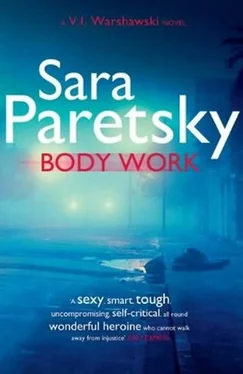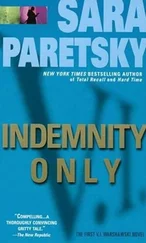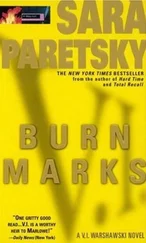I was making up the last item-it just seemed like a reasonable assumption. Since Widermayer actually looked as startled as possible for a boiled egg, it must have been accurate.
“Tell me about the evidence. Then I’ll know whether it’s worth talking to Rodney.”
“My clients pay for confidentiality.”
“In other words, you’ve got a big fat zero.”
“I’ve been around too long to let someone goad me into revealing confidential information. I’ll tell you, in exchange for another fat zero, that the police are taking my results very seriously.” No one ever said it was wrong to lie to Anton Kystarnik’s accountant.
Widermayer pretended to yawn. I sat on the cheap deal credenza that held his tax and law books. It wobbled a bit, and I wondered if it might give way beneath me, but I liked the way it distracted his attention.
“Olympia Koilada,” I said. “Anton Kystarnik bailed her out, and now she lets Rodney run tame around her club. If-”
“Who told you that?”
I smiled. “Sources. Nadia Guaman was getting Chad Vishneski all wound up. When he started attacking her in the club, it created a stir, and the club got in the news. Anton can’t afford to have a spotlight on him these days. The feds are already paying too much attention to him. So he gets Rodney to shoot Nadia and frame Chad, and two problems are solved at the same time.”
Widermayer gave a derisive snort. “I thought you were a detective, not a fairy-tale writer.”
“It doesn’t matter if it’s a fairy tale as long as the state’s attorney and a jury believe it.”
I drew my feet up under me, despite the bulk of my boots, and the credenza gave kind of a squawk.
“Get off that,” Widermayer said sharply. “If you break it, you replace it.”
“Fifty bucks at Walmart. Not worth worrying about.”
“Olympia Koilada doesn’t figure in your fairy tale, I notice, but if she’s your client I’d advise her to be very, very careful.”
“Yeah,” I said, “why’s that?”
“She hasn’t kept her side of a bargain she made, and that means she’s not trustworthy.”
The credenza wobbled under my weight. Widermayer watched it and me with as much alarm as his large plate of a face could express. I hopped off: I didn’t want to impale my spine on a tax book.
“If Olympia shows up dead or beaten, or something, you and Anton will definitely be the first ports of call for the cops. Not to mention your boy Rodney.”
“Nothing to do with me,” Widermayer said.
I leaned over the desk and smiled into his face. “He’s using your car. The law tends to hold you responsible for little things like that.”
“If you’re threatening me, you’re wasting your breath.”
I straightened up. “I wouldn’t call it a threat, Mr. Widermayer. More like information.”
As I left his office, I looked back to smile at him. Not even his eggy face could conceal his expression this time, and it wasn’t one that proclaimed eternal love and devotion.
21 The Super-Rich and Their Fascinating Lives
When I got back to my car, I wrote down the names I’d seen on Widermayer’s assistant’s computer while they were still fresh in my mind: Bettina Lyzhneska, Konstantin Feder, Michael Durante, Ludwig Nastase. An Eastern European crew, except for Durante and Rodney.
There were only a dozen or so cars in the lot, mostly the nondescript Fords and Toyotas that people like Widermayer’s assistant might drive. I copied down their license plates, anyway. Maybe I could push on my relationship with Murray and find out who they were registered to.
The Mercedes sedan Rodney had been using was parked there. I sat up straighter. Rodney drove a car registered to Widermayer, but I had a feeling that anything Widermayer owned really belonged to Kystarnik, or at least was available to him. Which probably included Rodney himself. He was exactly the kind of muscle Kystarnik might use.
I dug my maps out from under Mitch. Roehampton, where Kystarnik had his Chicago-area home, was only a few miles up the road. While I was this far north, I might as well see what eight hundred million dollars bought you. I started to query one of my subscription databases for Kystarnik’s home address, then realized how exposed I was sitting there. I drove back down Dundee Road and pulled into a strip mall. Wireless service in the northern suburbs was golden: before I could leave the car for a sandwich, LifeStory was flashing Kystarnik’s address and a few biographical details on my tiny screen.
I squinted at the text, but finally had to enlarge it and read it a few words at a time. I hated to think that glasses lay in my future, that my eyesight was dimming as my body was slowing down. Weren’t there any compensations for turning fifty?
Kystarnik had bought a house on seven acres almost twenty years ago. There were two pools, stables, tennis courts, three kitchens, nine bathrooms, and bedrooms enough to entertain all his visiting thugs at once, along with their partners and children. I assumed there were flunkies to look after the stables and kitchens and so on, but my little screen didn’t tell me that.
Kystarnik had been born in Odessa, but he’d lived in America since his late teens. He’d been married only once, to the woman who died eight months ago. Melanie Kystarnik, born Melanie Frisk, had been a native of Eagle River, Wisconsin. How had they met, I wondered, where had they met? Of course, Eagle River was notorious as the vacation refuge for members of the Chicago mob. Maybe as Kystarnik cut his teeth on the extortion racket, someone like the Outfit’s late, lamented CPA, Allen Dorfman, took Kystarnik under his wing. I pictured Anton and Melanie meeting at a Friday fish boil.
Melanie and Kystarnik had one child together, a daughter named Zina, who had died almost fifteen years ago, of unspecified causes. Even juice lenders suffer pain.
I drove up Telegraph Road to Argos Lane and found the gates to the Kystarnik place. Seven acres is a lot of ground; even though the bare trees and shrubs let me peer through the gates I couldn’t really see the house, although I did see little red lights that told me my pausing at the perimeter was being recorded.
In the city, I would have canvassed the neighbors, but out here it was hard to imagine a neighbor close enough to see what the Kystarniks were doing, even if I could weasel my way past their gates to talk to someone. And what plausible reason could I provide for asking?
I’d passed an indie coffee bar just before turning onto Argos Lane, so I turned around and went back. I needed a bathroom stop, anyway, and some kind of snack. The coffee itself smelled rich, fresh-roasted, unexpected in this exclusive, retail-lacking little enclave.
A utility service truck was in the lot, and a couple of cars. It was lunch hour; some eight or nine people, who looked as though they might work on the surrounding estates, were perched at the little tables with drinks and sandwiches. The two people behind the counter-young, fresh-faced-kidded with the regulars, but they treated me with an impersonal briskness.
When I’d ordered my cappuccino and a toasted cheese panino , I pulled out my map. “I’m looking for Argos Lane-how close am I?”
One of the men waiting for his coffee laughed. “You’re just about standing on top of it. You looking for anyone in particular?”
I flashed a grateful smile. “Melanie Kystarnik and I went to school together, and I thought, while I was in the area, I’d see if I could pay my respects to Anton.”
The people in line at the counter shifted a bit, as if trying to back away from me.
I spread my hands. “I know it’s been a while since she died, but I wasn’t able to get back for the funeral. We’d lost touch after she married-she was living in such a different world than what I knew-but we used to go canoeing together in Eagle River when we were kids. I know it was quite a blow when Zina died.”
Читать дальше












